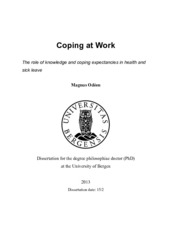Coping at Work. The role of knowledge and coping expectancies in health and sick leave
Doctoral thesis
Permanent lenke
https://hdl.handle.net/1956/12078Utgivelsesdato
2013-02-15Metadata
Vis full innførselSamlinger
- Faculty of Psychology [527]
Sammendrag
The main purpose of this thesis is to explore the effect of response outcome expectancies (coping) and knowledge on health and sick leave. The theoretical base of the thesis is the Cognitive Activation Theory of Stress (CATS) (Ursin & Eriksen, 2004) and the non-injury model (P. H. Sorensen et al., 2010). A new inventory for measuring response outcome expectancies (coping, helplessness and hopelessness); the Theoretically Originated Measure of the Cognitive Activation Theory of Stress, or TOMCATS, was developed and tested. The factor structure was confirmed and the convergent validity of TOMCATS was found to be satisfactory (paper 1). Response outcome expectancies from the TOMCATS inventory were significant predictors of health, and could also predict health independently of socioeconomic status (SES). Individuals with higher SES experienced more coping, less helplessness and hopelessness, and had better health (paper 1). In order to test the applied value of coping and knowledge, a systematic review of active workplace interventions with sick leave as an outcome was done. While most interventions did not significantly decrease sick leave, there was evidence that graded activity, the Sheerbrooke model and Cognitive Behavior Therapy (CBT) significantly reduced sick leave (paper 2). AtWork, an active workplace intervention based on the non-injury model, was tested in a cluster randomized controlled trial. The sample was 125 units of two Norwegian municipalities. The results indicated that an approach combining educational meetings, a colleague trained as a peer advisor and an outpatient clinic significantly reduced sick leave. Without the outpatient clinic the intervention had mixed results overall. The intervention was also feasible in the workplace (paper 3). The conclusion of the thesis is that coping can be measured in a satisfactory way, and that coping is a predictor of health as well as an interesting variable in the understanding of the relationship between health and socioeconomic status. There is evidence that some active workplace interventions are effective in sick leave reduction, but the success rate is low. A non-injury model approach with education, a colleague trained as peer adviser and an outpatient clinic was effective in reducing sick leave, and is a promising alternative to existing interventions.
Består av
Paper 1: Odeen, M., Westerlund, H., Theorell, T., Leineweber, C., Eriksen, H.R, & Ursin, H. (2013). Expectancies, Socioeconomic Status, and Self- Rated Health: Use of the Simplified TOMCATS questionnaire. International Journal of Behavioral Medicine, 20(2), 242-251. The article is available at: http://hdl.handle.net/1956/12074Paper 2: Odeen, M., Tveito, T. H., Magnussen, L. H., Mæland, S., Larun, L., & Eriksen H.R. (2013). Systematic review of active workplace interventions to reduce sickness absence. Occupational Medicine, 63(1), 7-16. The article is available at: http://hdl.handle.net/1956/12076
Paper 3: Odeen, M., Ihlebæk, C., Indahl, A., Wormgoor, M., Lie, S. A., & Eriksen, H. R. (2012). Effect of information and reassurance at the workplace on sick leave: A cluster randomized trial. Published as: Effect of Peer-Based Low Back Pain Information and Reassurance at the Workplace on Sick Leave: A Cluster Randomized Trial. Journal of occupational rehabilitation, 23(2), 209 -219. The article is available at: http://hdl.handle.net/1956/12077
